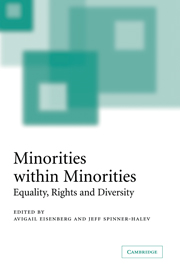Book contents
16 - A deliberative approach to conflicts of culture
Published online by Cambridge University Press: 22 September 2009
Summary
Liberal political theorists have recently argued liberal democratic states may jeopardize the principle of formal sex equality if they attempt to meet the demands of non-liberal or traditional cultural groups for greater recognition and powers of self-governance. This is not only a political claim, but rather includes a moral argument about which social practices liberal principles can permit and which it must proscribe. Brian Barry (2001a), Will Kymlicka (1995: chs. 3 and 5, 1999), and Susan Moller Okin (1999a, b) insist that cultural practices and arrangements that discriminate against women are morally indefensible from the standpoint of a liberalism committed to norms of autonomy and equality. Martha Nussbaum has employed her Aristotelian-inflected liberalism to argue that citizens' capabilities for human functioning are undercut by customs common in traditional societies, such as arranged marriage and polygyny (1999; 2000: 94, 109, 230, ch. 4). The broad political approach to non-liberal cultural practices favored by these thinkers is one that endorses liberal but not necessarily democratic principles and procedures, for states are said to determine the permissibility of minority cultural practices by gauging their compatibility with liberal, individual rights or particular capacities.
Against this liberal view, I argue that the best way to resolve tensions between traditional cultural practices and liberal principles in socially plural, democratic states is to defend and strengthen deliberation and decision-making practices that reflect a radical principle of democratic legitimacy.
Information
- Type
- Chapter
- Information
- Minorities within MinoritiesEquality, Rights and Diversity, pp. 340 - 362Publisher: Cambridge University PressPrint publication year: 2005
Accessibility standard: Unknown
Why this information is here
This section outlines the accessibility features of this content - including support for screen readers, full keyboard navigation and high-contrast display options. This may not be relevant for you.Accessibility Information
- 8
- Cited by
